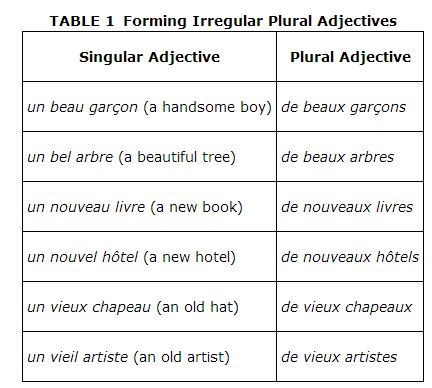Adjective Placement within Sentences
Most adjectives in French follow the noun they modify, for example, la maison blanche (the white house).
A few short, descriptive adjectives, usually expressing beauty, age, goodness, and size (you can remember this with the acronym “BAGS”), generally precede the nouns they modify:
- Beauty: beau (beautiful, handsome), joli (pretty)
- Age: nouveau (new), vieux (old), jeune (young)
- Goodness (or lack of it): bon (good), gentil (nice), mauvais (bad)
- Size: grand (large, big), petit (small, little), court (short), long (long), gros (fat)
Other common adjectives that precede the noun but do not fall into the BAGS categories include the following:
- autre (other)
- chaque (each, every)
- dernier (last)
- plusieurs (several)
- quelques (a few)
- tel (such)
- tout (all, whole, every)
Consider the following examples:
- un gros livre (a thick book)
- une jolie robe (a pretty dress)
- une autre histoire (another story)
- plusieurs idées (several ideas)
- une telle aventure (such an adventure)
In addition, tout precedes both the noun and the definite article ( le, la, l', les)
- tous les hommes (all the men)
- toutes les femmes (all the women)
To use more than one adjective in a description, place each adjective according to whether it precedes or follows the noun. Two adjectives in the same position are joined by et (and).
- une femme forte et athlétique (a strong, athletic woman)
- un grand et mauvais loup (a big, bad wolf)
- une petite voiture rouge (a small, red car)
Note that you may use past participles as adjectives, and they must agree with the nouns they modify:
- C'était un plaisir inattendu. (It was an unexpected pleasure.)
- Cette table est réservée. (This table is reserved.)
